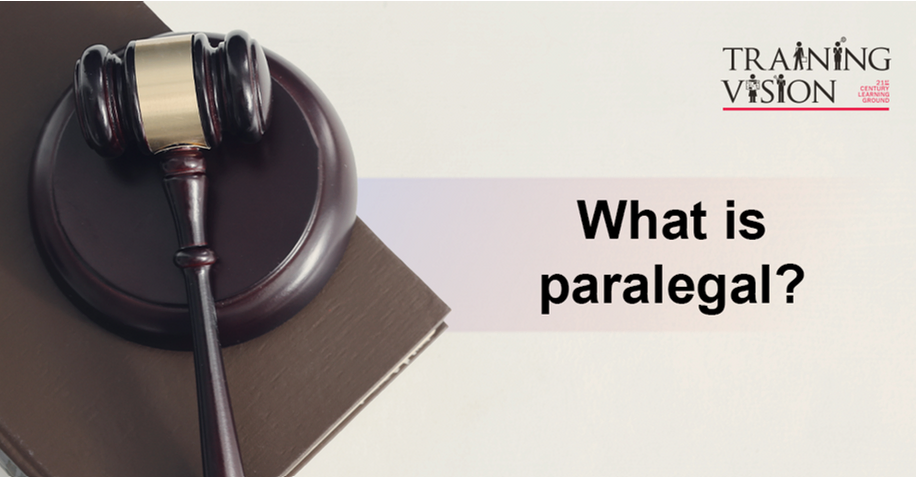Being a paralegal appears to be a prestigious career, and most people would actually agree. As trained professionals who are in the legal field, some of them are responsible for the success of most attorneys even if they usually work behind the scenes. You might have been considering becoming one, and there are a lot of good reasons why you want to become one. The work is so diverse compared to other administrative positions that it offers lots of room to hone your skills and provide vast learning and understanding of the legal system.
But what exactly is a paralegal? What does a paralegal do, in terms of the job description? And more importantly, how are you going to become a paralegal?
What is a paralegal?

What does a paralegal do?
Paralegals are specialty administrative professionals that are trained and possess skills specific to legal services. They are an integral part of the legal team as they are the ones assisting the lawyers in handling a wide range of legal administrative tasks including a vast amount of legal research, appointment setting, and drafting of legal documents. Paralegals cannot just be found in law firms, as they may also be in the company legal departments, individual attorneys’ offices, and even in government agencies. Introverts may find joy in working as a paralegal, as a big chunk of tasks involve working solo and with much less interaction. Although paralegals are usually highly trained on legal matters, they do not qualify to handle cases as lawyers do.
It is deemed as a specialty administrative position mainly because the administrative side of the paralegal’s work requires training. Briefs, depositions, affidavits, complaints, and other legal documents require the use of certain vocabularies and formatting. On the research side, one must have a certain amount of understanding of how the entire legal system works in order to come up with a well-researched case. Paralegals need to be critical thinkers too, as they assist the lawyers in coming up with a strong case to be presented in court. Organizing and filing documents might sound like a trivial job, but certainly not for these specialty administrative people because this means a much more well-organised filling, especially if it’s the exhibits that also need to be presented in court.
All of these may sound too intimidating, but the work is actually both challenging and quite enjoyable. And it’s getting all too interesting as well. If a paralegal appears to be the right hand of an attorney, then what exactly does a paralegal do?
Jobs of a paralegal

What are the jobs of a paralegal?
While a huge amount of a paralegal’s work is heavily administrative, there are some cases where the work also requires interactions with clients and other legal professionals. Here are some of the things that paralegals do.
Draft legal documents. Document drafting is one of the main tasks of a paralegal. Normally, they are called to draft different kinds of legal documents, and this can begin at the onset of their tenure. They write these documents with guidance of a lawyer, or another paralegal that has more experience. The attorney will still examine the document once it’s done, and if it meets approval, then that’s the time the attorney signs it. Legal documents include but are not limited to all kinds of contracts, affidavits, briefs, depositions, complaints, and subpoenas. This is the part of the paralegal’s job that requires the position to be more regulated.
Case management. The attorneys’ job is commonly known to be tedious and requires a huge amount of time. Thus, a certain degree of case management is oftentimes delegated to the paralegals. Case management can involve taking over the overall process of the case presentation, ensuring that every element of the case is well-organized and well-maintained. In this situation, the paralegals can also be required to communicate with the clients, but only as a representative of the lawyer, as opposed to giving legal advice which only licensed lawyers can do.
Research. It is common knowledge that when a lawyer presents a legal argument, it is backed up and based on extensive legal research. This is why a huge amount of paralegal’s working hours is dedicated to research. Paralegals have to carefully find precedents that can either strengthen or undermine a legal argument and support or overrule a legal action. Although, the research part is just the beginning. The paralegal also has to examine the documents to ensure that they contain relevant elements and find out how they can use them for legal arguments.
Interaction with clients. As mentioned, paralegals are sometimes required to interact and contact clients, although restricted. The interaction should be for administrative purpose only, as paralegals cannot assume the role of the lawyer in providing legal advice. Thus, the paralegals also have the responsibility to make sure that the client understands their role. This is important because the client is also expected to understand that whatever they confide to the paralegal is not protected with the attorney-client confidentiality. However, in some cases, the paralegal acts as a conduit of information between the client and the attorney. They are also the ones that can be responsible for the billing process and draft documents on behalf of either the lawyer or the client, but they are actually not allowed to set and even collect legal fees.
Another scope of work and requirements. The paralegal’s job can be pretty extensive and varied. Thus, apart from drafting legal documents, case management, legal research, and interacting with clients, they also have to be competent when it comes to other office tasks. The job also involves a great deal of filing and organization–especially with the legal documents and other paperwork, for ease of access. They are also in charge of updating the law library for the new precedents, annotations, laws, and policies.
Benefits of taking a paralegal course
Being a paralegal sounds like a rewarding job, albeit challenging and pretty demanding. It requires a lot of skills, and traditionally, if you want to become a paralegal, you are required to have at least an associate degree in a related field. But times have changed–there are now specialty programs that provide training for a specific profession like a paralegal. If you already have an associate degree, it is still recommended that you take a paralegal course as it will be highly beneficial for you and your career in the long run.
Paralegal is a specialty administrative work. Yes, it’s hugely administrative work but it is still focused on a specific field–legal, and it is a tedious one at that. If you want to be a paralegal, it is imperative that you have more than a basic understanding of the law. College must have taught you a lot, but not the specifics. At least, if you take a paralegal course, it is focused on the information that you need and will be crucial to your job.
Paralegals are required to be self-regulated. Reading through the roles and responsibilities of a paralegal, it is clear that there is a line between being a specialty administrative professional and being an actually licensed lawyer. You can communicate with the clients but not about the reason why they are in the law office. You can be involved in the billing process but you cannot actually set the legal fees and even collect them. These things and more require a whole lot of self-regulation. Taking a paralegal course can teach you how to self-regulate and will let you know more about what you are allowed and not allowed to do.
Paralegal courses are specific to the things you need to know in the legal industry. Legal management in school may be prestigious and all, but once you get into the workforce, you’ll learn that there are more important things that are not taught in college. Paralegal courses are your best bet to be taught these things. Plus, it’ll help you remember most of the things you learned in school.
It speeds up the process of your entry into the workforce. While law firms and attorneys are more than happy to hire non-trained paralegals for an entry-level position, having taken the paralegal course and obtaining a certification provides an edge and several steps ahead into the workforce. Most employers would prefer hiring people that have more learning so they do not have to train further.
It can land you in a high-end paralegal position. While paralegals normally do not need a license, obtaining paralegal training makes you several steps ahead of other applicants. Through your certification, your employer can assess your skills and knowledge of the job and may therefore place you in a higher position that can potentially provide a higher salary.
While it is true that the paralegal career is challenging, it is equally rewarding and engaging. You just have to make sure you have all the basic qualifications and you’re good to go, and it is much better if you were able to take a course and obtain certification. If this career sounds amazing and you think you can definitely do it, look for an educational program that suits you best and start your career now.
Interested in pursuing your career as a paralegal? We have upcoming cohorts for our programme, Diploma in Paralegal Studies. Talk to our consultants via this link to learn more.








